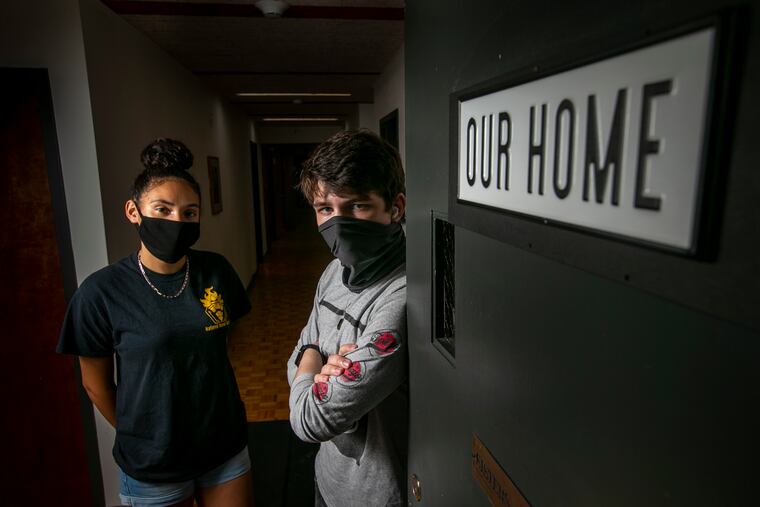This Philly nonprofit planned to offer housing to homeless college students. Then the pandemic hit. | Helen Ubiñas
“I was skeptical,” said Dylanger Thomas-Brodsky Johnson. “I was like, ‘There has to be a catch.’ But there isn’t. This place is literally the perfect program.”

It’s the rug that does it for Anna Thomas.
After years of couch-surfing, the La Salle University freshman finally has a place of her own. It’s in a converted Philadelphia convent that Depaul USA, a Germantown nonprofit, turned into housing for college students experiencing homelessness.
Family and friends helped the 18-year-old personalize her room. But when we talked this week, she confided that it’s the $38 “gray, fluffy rug” she bought online that makes the space truly feel “homey.”
Growing up, Thomas used to wait until right before the doors of her Kensington charter school were being locked for the evening. And then, she’d scroll through her phone in search of a place to spend the night.
Her family was thrown into chaos after her father left when she was 10. Relatives were always supportive of her and her siblings, she said, but it was hard not to feel like an imposition. “It wasn’t their fault that I was going through what I was going through,” she said.
She was temporarily staying with her grandmother when she found out she got enough financial aid to pay for La Salle tuition, but not enough for housing.
» READ MORE: Tiny homes made in Amish country could soon house Philly’s homeless
In another room of what is called St. Joseph’s House, Dylanger Thomas-Brodsky Johnson recalled being in and out of foster care. When his adoptive parents planned to move out of the area, he decided he’d juggle as best he could his freshman year at Temple University studying criminal justice with a full-time job. He didn’t receive enough aid for housing, but he plans to start driving for Uber soon. And then he learned of the new residential program in the West Oak Lane neighborhood that offers support services — including academic and career counseling, an open pantry, and even the occasional casserole dropped off by thoughtful neighbors.
“I was skeptical,” said Johnson, who is also 18. “I was like, ‘There has to be a catch.’ But there isn’t. This place is literally the perfect program.”
What wasn’t perfect was the timing, which coincided with the coronavirus pandemic.
Sandra Guillory, Philadelphia director at Depaul USA, said they planned to open the program, with a mix of city and private funding for 24 Philadelphia students, sometime in April. But when the coronavirus hit, they sped up construction and moved students in earlier. Ten have so far moved in.
“We were afraid that students were going to leave campuses, not have a safe place to go, and might drop out of college,” she said. It was one of many changes they made on the fly. The transitional housing program was originally slated for upperclassmen who might otherwise drop out without a place to live. But it quickly became clear that affordable housing is an issue for students at every stage.
Few know that better than Sara Goldrick-Rab, a professor at Temple University and one of the nation’s experts on student homelessness. Her team at the university’s Hope Center for College, Community and Justice advised on the project’s planning and program development.
“Given how few people in this country have even taken seriously the idea that college students can be homeless … this is genuinely exciting,” she said.
But she also warned that persistent misconceptions about college students mean vital help still isn’t reaching them.
“There are going to be those who say, and it’s totally predictable: ‘Just get a job,’” she said. “I hope you know that all of our surveys show these students already have jobs. I hope you also know that they’re going to say there are other people who aren’t in college who need housing, too. Yep, absolutely. What we’re trying to do here is keep these students from being on the street, too. What’s the point of having more people on the street?”
However compelling the stories of homeless students — and these are just two of countless others — Goldrick-Rab believes the growing numbers will eventually force a meaningful reckoning.
“There’s growing interest because there has been growing evidence,” she said. “We do things in this city and around this country because they’ve been counted. Only when we count how many students are affected does anybody start doing anything. Stories, unfortunately, are never enough.”
A newly released report by her center found more than half of Philly college students at two-year campuses, and one-third at four-year universities, were having difficulty accessing adequate food and secure housing.
And that was before the coronavirus left schools and students scrambling. Students whose stories we might never hear before they are forced to give up on their dreams.
For the first time in a long time, Thomas can see her future clearly. She plans on majoring in psychology.
“I want to become a therapist because I feel like growing up, I wasn’t really listened to that much,” she said. “I’d like to be that support to people.”
These days, after working part time at FedEx and taking remote classes, she retreats to her room.
She likes to sit in the middle of her rug, close her eyes, and savor the peace that until now had eluded her.